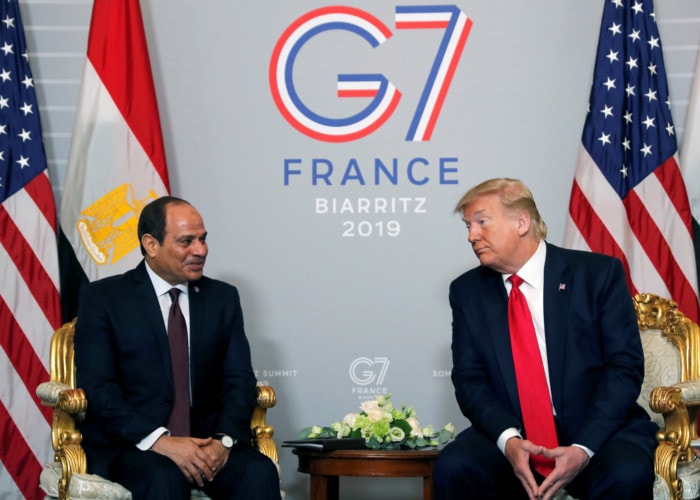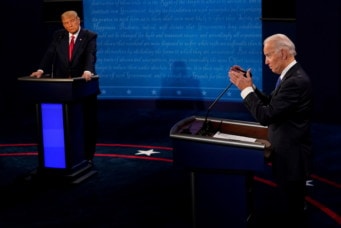Short perspectives on the United States’ foreign policy in the Middle East after the November 2020 presidential election
How will a Trump or Biden presidency shape the future of U.S. foreign policy in the Middle East?

U.S. President Donald Trump meets Egypt’s President Abdel-Fattah el-Sisi for bilateral talks during the G7 summit in Biarritz, France, August 26, 2019. Carlos Barria/Reuters.
The United States of America will continue to be a global power for the next twenty-five years at the very least given its wealth and relative propensity to exercise military power beyond its borders. Another given is that the global and national sociopolitical and economic paradigms in the United States and the Middle East will change. In fact, these two givens are what have driven us to address the question of America’s role after the upcoming presidential election in November and to do so from different international perspectives. Our answers will more reflect how rather than whether the United States will exert itself in different domains.
In reflecting on possible American policies in the Middle East, it is worth noting that both America and the Middle East are going through identity crises, each increasingly uncomfortable with its respective traditional status quo politics. In America, the Tea Party movement, the Obama and Trump elections, and the ongoing racial tensions that are polarizing the country all provide grounds for domestic soul-searching, with paramount consequences for America’s international role. Similarly, in the Middle East, the conflicting trends and forces driving toward increased secularism or conservative political Islam, and the youth bulge versus traditionalism and social conservatism, are all soul-searching catalysts that have found expression for decades, most recently in what is described as the Arab Spring.
These factors may cause tectonic shifts in the relations between Middle Eastern countries and the United States. They have affected and will continue to affect U.S. policy in the region irrespective of who is elected U.S. president. Let us not forget that the debate about how much engagement the United States should have in the Middle East is longstanding. In fact, it was Obama who declared his intention to pivot from the Middle East to Asia.
Today we live in a different world from when the Middle East was central to East–West rivalry and the United States was highly dependent on the region’s oil. I remember President Richard Nixon telling the Egyptian Foreign Minister after the 1973 Arab-Israeli War that, had the United States known that Egypt would ask Soviet experts to leave the country, it would have offered something in return, because the request significantly decreased Soviet influence in the Middle East. Regardless, he concluded that “Egypt [now] is a strategic partner.” I also remember the long lines at gas stations in the United States at the time due to the Arab oil embargo imposed in light of America’s unwavering support for Israel.
Simply put, in the absence of a full force Cold War, the Middle East no longer factors into the American foreign policy equation with the same weight, especially with the United States’ diminishing energy needs in light of technological developments and policy changes that allow it to use shale fracking technology to expand its energy reserves. This will remain true whether Trump is reelected or Biden is elected. The basic difference will be that the United States’ foreign relations will focus more on each of the states in the Middle East, rather than on a regional or group prism concerned with previous international security issues associated with the Cold War or energy needs.
Middle Eastern states, Arab or non-Arab, are not deaf or blind to this shifting American focus and posture. They see the United States’ increasing individual, regional, or even subregional focus in the Levant, the Gulf area, and North Africa. The conclusion drawn is that, while well-managed relations with the United States are always useful and important, assurances of its support on national security issues will increasingly be in question. This will unleash a regional race to enhance national security capacities, one with shifting interests as well as new and nontraditional global and regional relationships and alliances, often with complicated baggage. Turkey’s relations with Libya, Russia, and Qatar; the United Arab Emirates’ and Bahrain’s relations with Israel, Iran, Turkey, and Russia; and the relations among Egypt and older Arab states are but a few examples of this trend.
My primary conclusion is that the United States will look at the Middle East differently as the region moves forward, irrespective of who wins the U.S. presidential elections in November. We in the Middle East will become more region-centric and more multidimensional in our international relations to avoid becoming overwhelmingly or exclusively dependent on a single major foreign power.
Numerous domestic constituencies in the United States have become increasingly isolationist and particularly circumspect about putting the country’s human resources in harm’s way abroad. They are conflict-fatigued, particularly with regard to the Middle East, and do not see a global threat to America’s interests that justifies wasting resources abroad. Consequently, it appears safe to conclude from reading the American political landscape that the United States will seek to be less operationally engaged in the Middle East, regardless of whether it is led by a Democratic or Republican president. The real question is whether events in the Middle East will allow it to disengage.
A third conclusion is that in an era of identity searching, the Middle East and the United States will be unable or unwilling to completely delink from one another. There are simply too many dependencies and moving parts to do this.
Consequently, in the short and medium terms, the difference between past relations between the Middle East and the United States and those over the next decade or so will be reflected in shades of grey rather than black and white. This will remain true irrespective of whether Trump or Biden wins the November 2020 US presidential elections.
Allow me to elaborate further and more specifically on this comment:
- U.S. military engagement will decrease in size under either president. Though the Middle East will depend less on major foreign powers, it will still depend more on America than others.
- Anti-Iran policy will be more forceful under Trump than Biden, but neither wants to use force. There will be no potential for reinstating the Iran nuclear deal under Trump; doing so will be difficult even under Biden. Iran has already significantly progressed in nuclear enrichment.
- Trump and Biden are professional dealmakers and would exercise realpolitik in Syria; Trump a little more so. But, real political operations would require a grand design and sophisticated packaging. Let us not forget that the Clinton administration first reached out to Syria, albeit not very coherently. Trump will not have a problem reaching out to Syria, as he has repeatedly mentioned making a deal with Turkey, Iran, Israel, and the Gulf countries, all potentially important players in a grand bargain. Ironically, if tensions arise in the Middle East, America’s allies in the region will goad Biden into reacting forcibly towards Iran more easily than Trump.
- The Arab–Israeli peace process will focus on the distorted parameters of Trump’s Palestinian–Israeli peace plan if he is elected. If Biden wins, he will not embrace Trump’s plan, but will choose not to put Israel under any pressure unless its politics shift more positively toward a two-state solution. The current trend toward normalization between Israel and some Arab Gulf states will be misconstrued by some to validate Trump’s approach, when in fact these countries still support the two-state solution based on the 1967 boundaries. Nevertheless, I do not expect Biden to aggressively push Israel to be more progressive in peacemaking, as the domestic political capital required to do so would be better invested in promoting other elements of his agenda, particularly those regarding domestic affairs.
- One variable and possible catalyst for a shift in policy for the next American administration, especially if it is under Biden, is increased Arab activism and creativity in peacemaking, which could lead to a deal that would garner international support. Regrettably, this possibility seems far fetched.
- Egyptian–American relations will initially have an easier restart with Trump rather than Biden. However, even with Trump, the restart will eventually struggle, because Trump is more transactional than strategic. And, he will bring into question the return on U.S. support to Egypt. With Biden, these relations will be tested in the short term: first, because he will want to appear to be the anti-Trump; second, because his administration will be more susceptible to the influence of different stakeholders in Washington, especially those from civil society.
- Emirati and Saudi relations with the next American administration will follow a similar pattern as that of Egypt. In the short term and a little beyond, these relations will be smoother with Trump. However, in the medium term, given that Trump is excessively transactional, if the stream of deliverables with regard to his demands is not met, these relations could become strained even under a Republican administration.
- Nevertheless, in the extended medium and long terms, the United States, whether it is under Trump or Biden, cannot afford to ignore or discard Egypt, the Emirates, or Saudi Arabia. The U.S. has global interests in which the Middle East plays an important role, even if its influence is admittedly decreasing.
- The degree of change and comfort in relations between the United States and these three countries over the medium and long terms will in fact be largely determined by how productive they are in their own region (i.e., the Middle East). These countries will also continue to need the United States, so they will attempt to accommodate it irrespective of whether Trump or Biden is elected.
- North Africa will become more complicated and relevant as it increasingly factors into the Middle Eastern security equation. This is especially true in light of an increasing Russian role in Libya. However, the region does not seem to be a priority area for the United States, and this is not expected to change under Biden or Trump.
- Relations with Turkey, which is normally considered to be on the outer perimeter of the Middle East, will be interesting. Democratic and Republican administrations have had sensitive and complicated relations with President Erdogan. It could be quite problematic if Turkey continues its aggressive, assertive, and even hegemonic policy in the Middle East, especially given its tensions with Greece, a fellow North Atlantic Treaty Organization (NATO) member in the Mediterranean, and warming relations with Russia.
- On Iraq, it is important not to jump to the conclusion that a Biden administration would be more active in Iraq. This is false. Biden jointly published an article in the first decade of this century calling for splitting Iraq into three. Neither administration will want to increase operational engagement in Iraq, even against terrorism or in support of the Kurds.
- One can imagine potential Chinese–American energy competition for Middle Eastern supply. However, the increase in Chinese demand comes at a moment when the United States has decreasing demand for foreign energy sources. China is still obviously potentially a very big power, albeit one that has refrained from using its military capacity too far from its borders. It has strong demand for natural resources and markets. These factors contribute to the growth of blue water capacity and potential conflict on maritime waterways, which in the medium and long terms may become a potential source of contention between the United States and China in the Middle East.
Nabil Fahmy is a former foreign minister of Egypt. He is also Dean Emeritus and Founding Dean of the School of Global Affairs and Public Policy at the American University in Cairo. He served as Egypt’s ambassador to the United States from 1999 to 2008, and as envoy to Japan between 1997 and 1999. On Twitter: @DeanNabilFahmy.
Read More


